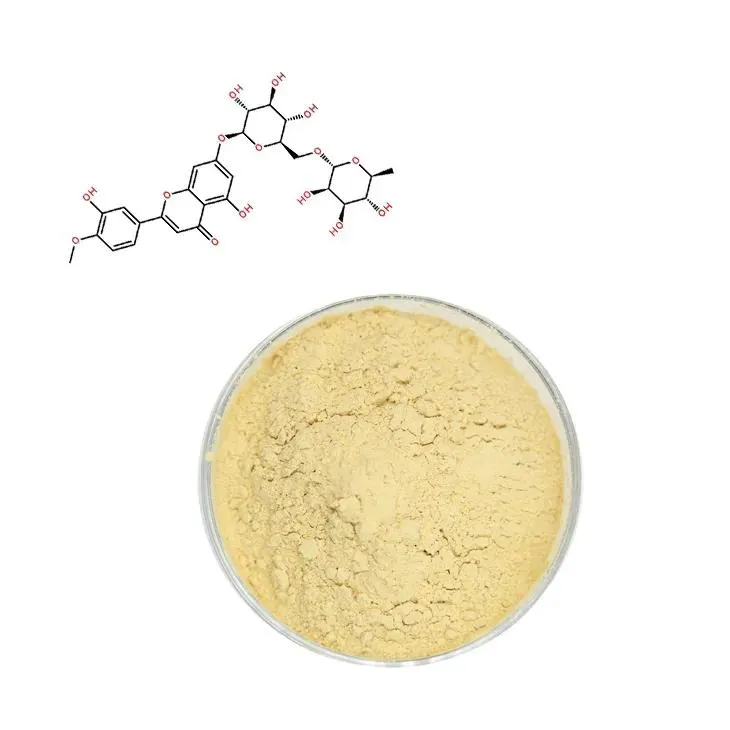- 0086-571-85302990
- sales@greenskybio.com
What is diosmin extracted from?
2025-05-13

Diosmin is a naturally occurring compound that has garnered significant interest in scientific and medical communities due to its therapeutic properties, particularly in vascular health. Often used in supplements for treating various circulatory disorders, Diosmin is prized for its ability to improve vein function and alleviate related symptoms. This article explores the origins of Diosmin, detailing its extraction source, typical uses, and the scientific basis for its applications in health and medicine.
Origins and Extraction of Diosmin
Diosmin is classified as a flavonoid, a group of plant metabolites known for their antioxidant properties and their role in plant physiology. Diosmin is particularly abundant in citrus fruits, especially the peels, where it works alongside other flavonoids to contribute to the fruit's defense systems. The primary sources for extracting diosmin commercially include the peels of various citrus fruits such as oranges, lemons, and limes.
The process of extracting diosmin from citrus fruits involves several steps. Initially, the citrus fruits are harvested and their peels are collected. These peels undergo an extraction process using solvents that separate diosmin from other components found in the citrus peel. Following extraction, purification techniques ensure the diosmin is isolated in a form suitable for supplement production. Advanced extraction methodologies, including supercritical fluid extraction and other environmentally friendly techniques, are being increasingly employed to optimize yield and purity without the use of harsh chemicals.
These extraction processes leverage the natural abundance of diosmin in citrus peels while preserving the compound's structural integrity and bioactivity. The quality and efficacy of diosmin supplements are directly related to the purity of the genteel extraction processes employed, making it a highly controlled aspect of commercial production.

Applications of Diosmin in Health
Due to its potent biological effects, diosmin is widely utilized in health supplements, particularly those targeting venous and circulatory issues. Its primary application lies in the treatment of venous disorders, including chronic venous insufficiency (CVI), hemorrhoids, and varicose veins. These conditions result from the malfunctioning of veins due to weakened vein walls or damaged valves, leading to symptoms such as swelling, discomfort, and discoloration.
Chronic Venous Insufficiency (CVI): Diosmin is commonly prescribed to alleviate the symptoms of CVI. It enhances venous tone, reduces inflammation, and decreases the risk of venous thrombosis. Its efficacy is attributed to its ability to modulate the vascular bed, improve lymphatic drainage, and reduce capillary permeability. Clinical studies have shown that diosmin, often combined with Hesperidin, can significantly reduce leg edema and improve the quality of life for patients suffering from CVI.
Hemorrhoids: Known for its vasoprotective properties, diosmin is effective in treating acute hemorrhoidal attacks. It works by strengthening blood vessels, reducing inflammation, and decreasing discomfort associated with hemorrhoids. Its long-term use has been associated with a reduced occurrence of severe hemorrhoidal symptoms.
Varicose Veins: Diosmin helps in the symptomatic treatment of varicose veins by decreasing vein distention and promoting blood flow. It alleviates symptoms such as aching and heaviness in the legs, encouraging better circulation and vein health.
Anti-inflammatory and Antioxidant Effects: Beyond its vascular benefits, diosmin exhibits antioxidative properties by neutralizing free radicals, reducing oxidative stress, and combating inflammation. This makes it a valuable addition for comprehensive health regimens aimed at reducing systemic inflammation.
Scientific Basis for Diosmin's Efficacy
The therapeutic potential of diosmin is supported by a substantial body of scientific research which elucidates its mode of action and effects on the vascular system. Diosmin operates primarily through its interaction with enzymes and pathways involved in vascular and lymphatic function. It improves endogenous antioxidative defenses and modulates the expression of inflammatory mediators, thereby providing vascular protection.
Research highlights include the ability of diosmin to improve venous tone, strengthen vein walls, and promote lymphatic circulation. A study published in the Journal of Vascular Surgery highlighted diosmin’s effectiveness in decreasing swelling and improving venous function in patients with CVI. The anti-inflammatory effects also extend beyond vascular health, benefiting conditions linked to chronic inflammation.
Moreover, diosmin's role in improving microcirculation significantly enhances nutrient and oxygen delivery to tissues, facilitating healing and promoting healthier skin and tissue function. This holistic activity underlies its widespread application in treating vascular disorders.
Safety and Considerations
Diosmin is generally considered safe when used according to recommended guidelines. Nevertheless, it is essential for individuals considering diosmin supplementation to consult healthcare providers, especially when pre-existing conditions or concurrent medications are involved. While side effects are rare, some individuals may experience mild gastrointestinal disturbances or allergic reactions, necessitating professional guidance for personalized use.
Conclusion
Diosmin, extracted primarily from citrus peels, stands out as a potent flavonoid offering impressive benefits for vascular health. Its applications in treating venous disorders such as CVI, hemorrhoids, and varicose veins exemplify its valuable role in improving blood vessel function and systemic health. Supported by scientific research, diosmin’s antioxidative and anti-inflammatory actions provide a comprehensive approach to vascular care and overall wellness. As with any health supplement, informed use guided by healthcare professionals ensures its beneficial effects are maximized safely and effectively.
- ▶ Hesperidin
- ▶ Citrus Bioflavonoids
- ▶ Plant Extract
- ▶ lycopene
- ▶ Diosmin
- ▶ Grape seed extract
- ▶ Sea buckthorn Juice Powder
- ▶ Fruit Juice Powder
- ▶ Hops Extract
- ▶ Artichoke Extract
- ▶ Mushroom extract
- ▶ Astaxanthin
- ▶ Green Tea Extract
- ▶ Curcumin
- ▶ Horse Chestnut Extract
- ▶ Other Product
- ▶ Boswellia Serrata Extract
- ▶ Resveratrol
- ▶ Marigold Extract
- ▶ Grape Leaf Extract
- ▶ New Product
- ▶ Aminolevulinic acid
- ▶ Cranberry Extract
- ▶ Red Yeast Rice
- ▶ Red Wine Extract
-
Green Tea Extract
2025-05-13
-
Angelica sinensis extract
2025-05-13
-
Pueraria Lobata Extract
2025-05-13
-
Passionflower Extract
2025-05-13
-
Curcumin
2025-05-13
-
Nettle Root Extract
2025-05-13
-
Nettle leaf extract
2025-05-13
-
Natural grape seed extract
2025-05-13
-
Grape Leaf Extract
2025-05-13
-
Nutmeg Extract
2025-05-13





















